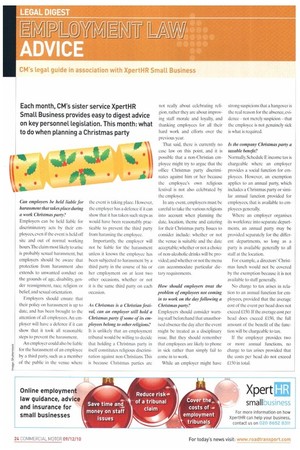ADVICE
Page 24

If you've noticed an error in this article please click here to report it so we can fix it.
CM's legal. guide in association with XpertHR Small Business Each month, CM's sister service XpertHR Small Business provides easy to digest advice on key personnel legislation. This month: what to do when planning a Christmas party
Can employers be held liable for harassment that takes place during a work Christmas party?
Employers can be held liable for discriminatory acts by their employees, even if the event is held off site and out of normal working hours:The claim most likely to arise is probably sexual harassment, but employers should be aware that protection from harassment also extends to unwanted conduct on the grounds of age, disability, gender reassignment, race, religion or belief, and sexual orientation.
Employers should ensure that their policy on harassment is up to date, and has been brought to the attention of all employees. An employer will have a defence if it can show that it took all reasonable steps to prevent the harassment.
An employer could also be liable for the harassment of an employee by a third party, such as a member of the public in the venue where the event is taking place. However, the employer has a defence if it can show that it has taken such steps as would have been reasonably practicable to prevent the third party from harassing the employee.
Importantly, the employer will not be liable for the harassment unless it knows the employee has been subjected to harassment by a third party in the course of his or her employment on at least two other occasions, whether or not it is the same third party on each occasion.
As Christmas is a Christian festival, can an employer still hold a Christmas party if some of its employees belong to other religions? It is unlikely that an employment tribunal would be willing to decide that holding a Christmas party in itself constitutes religious discrimination against non-Christians. This is because Christmas parties are not really about celebrating religion, rather they are about improving staff morale and loyalty, and thanking employees for all their hard work and efforts over the previous year.
That said, there is currently no case law on this point, and it is possible that a non-Christian employee might try to argue that the office Christmas party discriminates against him or her because the employee's own religious festival is not also celebrated by the employer.
In any event, employers must be careful to take the various religions into amount when planning the date, location, theme and catering for their Christmas party. Issues to consider include: whether or not the venue is suitable and the date acceptable; whether or not a choice of non-alcoholic drinks will be provided; and whether or not the menu can accommodate particular dietary requirements.
How should employers treat the problem of employees not coming in to work on the day following a Christmas party?
Employers should consider warning staff beforehand that unauthorised absence the day after the event might be treated as a disciplinary issue. But they should remember that employees are likely to phone in sick rather than simply fail to come in to work.
While an employer might have strong suspicions that a hangover is the real reason for the absence, evidence not merely suspicion that the employee is not genuinely sick is what is required.
Is the company Christmas party a taxable benefit?
Normally, Schedule E income tax is chargeable where an employer provides a social function for employees. However, an exemption applies to an annual party, which includes a Christmas party or similar annual function provided for employees, that is available to employees generally.
Where an employer organises its workforce into separate departments, an annual party may be provided separately for the different departments, so long as a party is available generally to all staff at the location.
For example. a directors' Christmas lunch would not be covered by the exemption because it is not available to staff generally.
No charge to tax arises in relation to an annual function for employees, provided that the average cost of the event per head does not exceed £150. If the average cost per head does exceed £150, the full amount of the benefit of the function will be chargeable to tax.
If the employer provides two or more annual functions, no charge to tax arises provided that the costs per head do not exceed £150 in total.
























































































































